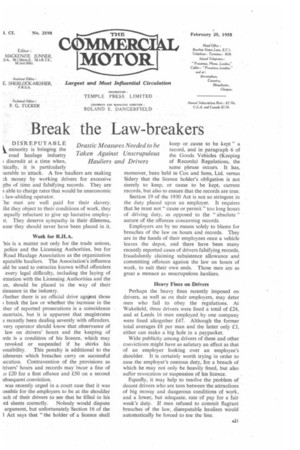Break the Law-breakers
Page 23

If you've noticed an error in this article please click here to report it so we can fix it.
DISREPUTABLE minority is bringing the road haulage industry discredit at a time when, rtically, it is particularly Eterable to attack. A few hauliers are making 2k money by working drivers for excessive ;ths of time and falsifying records. They are s able to charge rates that would be uneconomic L law-abiding operator.
'he men are well paid for their slavery. ilst they object to their conditions of work, they equally reluctant to give up lucrative employit. They deserve sympathy, in their dilemma, ause they should never have been placed in it.
Work for R.H.A.
'his is a matter not only for the trade unions, police and the Licensing Authorities, but for Road Haulage Association as the organization eputable hauliers. The Association's influence aid be used to ostracize known wilful Offenders every legal difficulty, including the laying of rination with the Licensing Authorities and the ce, should be placed in the way of their tinuance in the industry.
ihether there is an official drive against those break the law or whether the increase in the iber of reported prosecutions is a coincidence mcertain, but it is apparent that magistrates e recently been dealing severely with offenders. very operator should know that observance of law on drivers' hours and the keeping of 1rds is a condition of his licence, which may revoked or suspended if he shirks his ponsibility. This penalty is additional to the ishments which breaches carry on successful ;ecution. Contravention of the provisions as [rivers' hours and records may incur a fine of .o £20 for a first offence and ED on a second ubsequent conviction.
was recently urged in a court case that it was ossible for the employers to be at the shoulder ach of their drivers to see that he filled in his ,rd sheets correctly_ Nobody would dispute argument, but unfortunately Section 16 of the 3 Act says that "the holder of a licence shall keep or cause to be kept" a record, and in paragraph 6 of the Goods Vehicles (Keeping of Records) Regulations, the same phrase occurs. It has, moreover, been held in Cox and Sons, Ltd. versus Sidery that the licence holder's obligation is not merely to keep, or cause •to be kept, current records, but also to ensure that the records are true.
Section 19 of the 1930 Act is not so stringent in the duty placed upon an employer. It requires that he must not" cause or permit" too long hours of driving duty, as opposed to the " absolute " nature of the offences concerning records.
Employers are by no means solely to blame for breaches of the law on hours and records. They are in the hands of their employees once a vehicle leaves the depot, and there have been many recently reported cases of drivers falsifying records, fraudulently claiming subsistence allowance and committing offences against the law on hours of work, to suit their own -ends. Those men are as great a menace as unscrupulous hauliers.
Heavy Fines on Drivers Perhaps the heavy fines recently imposed on drivers, as well as on their employers, may deter men who fail to obey the regulations. At Wakefield, three drivers were fined a total of £24, and at Leeds 16 men employed by -one company were fined altogether £47. Although the former total averages £8 per man and the latter only £3, either can make a big hole in a paypacket.
Wide publicity .among drivers of these and other convictions might have as salutary an effect as that of an employer looking over an employee's shoulder. It is certainly worth trying in order to ease the employer's onerous duty, for a breach of which he may not only be heavily -fined, but also suffer revocation or suspension of his licence.
Equally, it may help to resolve the problem of decent drivers who are torn between the attractions of big money and dangerous conditions of work, and a lower, but Adequate, rate of pay for a fair week's duty. If men refused to commit flagrant breaches of the law, disreputable hauliers would automatically be forced to toe the line.




















































































